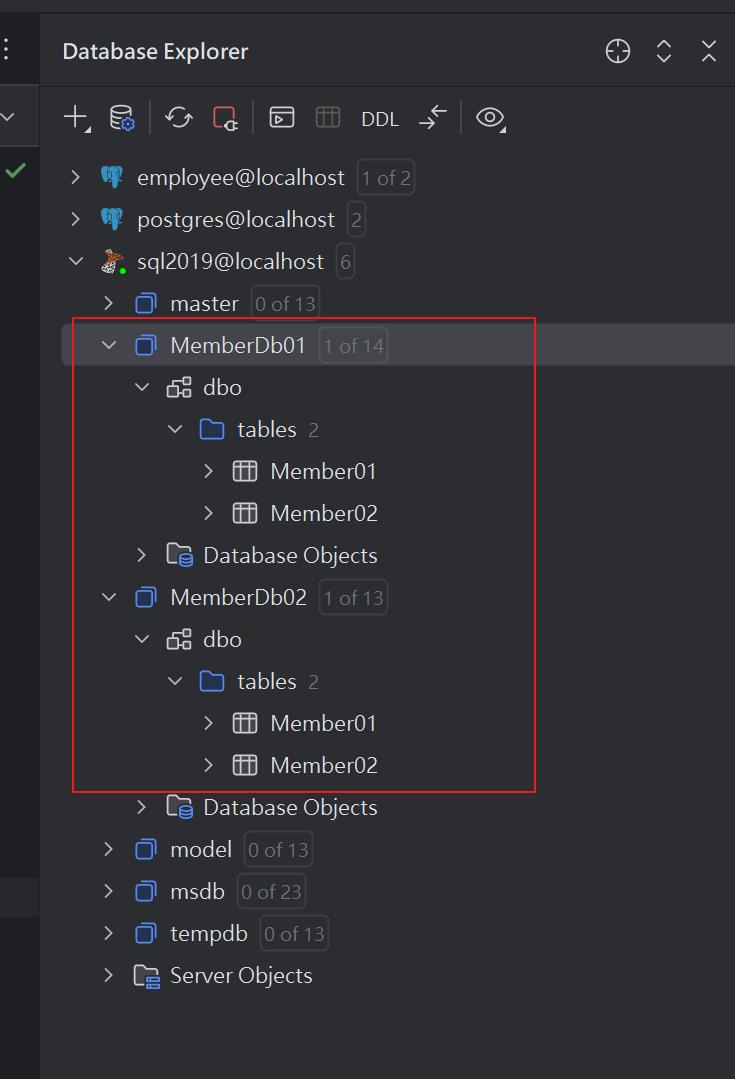公司的資料庫有很多功能用到了分表分庫,根據條件,決定要連哪一台資料庫,用哪一張資料表,概念上很簡單,花了一點時間研究,EF Core 的寫法。

資料庫已經存在,在不同的資料庫,有相同的資料結構,應用程式必須要透過不同的參數來決定要指向哪一台資料庫執行個體?哪一個資料庫?哪一個表?
下圖是這次要處理的目標,我預期,目標資料庫結構如下圖:

資料表結構
use MemberDb01
go
create table dbo.Member02
(
Id varchar(50) not null
constraint Member02_pk
primary key,
Name nvarchar(20),
Age int,
SequenceId bigint identity,
CreatedAt datetimeoffset not null,
CreatedBy nvarchar(50),
ChangedAt datetimeoffset,
ChangedBy nvarchar(20),
Email varchar(50)
)
go
開發環境
- Windows 11 Home
- Rider 2024.2.7
實作
dotnet ef dbcontext scaffold 產生 EF Entity
若是要要透過 dotnet ef dbcontext scaffold 產生 EF Entity,必須要賦予正確的名字
ef-codegen-member:
desc: EF Core 反向工程產生 MemberDbContext EF Entities
dir: "src/Lab.Sharding.DB"
cmds:
- dotnet ef dbcontext scaffold "$SYS_DATABASE_CONNECTION_STRING1" Microsoft.EntityFrameworkCore.SqlServer -o AutoGenerated/Entities -c MemberDbContext --context-dir AutoGenerated/ -n Lab.Sharding.DB -t Member01 --force --no-onconfiguring --use-database-names
資料表就會像這樣,如果有 10 資料表,就會有 10 個不同名稱的類別,這樣直接用應該也不會有太大的問題,只是程式碼會多了很多的判斷,若再扯上關連可能會變得更複雜
public partial class Member01
{
public string Id { get; set; } = null!;
public string? Name { get; set; }
public int? Age { get; set; }
public long SequenceId { get; set; }
public DateTimeOffset CreatedAt { get; set; }
public string? CreatedBy { get; set; }
public DateTimeOffset? ChangedAt { get; set; }
public string? ChangedBy { get; set; }
public string? Email { get; set; }
}public partial class MemberDbContext : DbContext
{
public MemberDbContext(DbContextOptions<MemberDbContext> options)
: base(options)
{
}
public virtual DbSet<Member01> Member01s { get; set; }
protected override void OnModelCreating(ModelBuilder modelBuilder)
{
modelBuilder.Entity<Member01>(entity =>
{
entity.HasKey(e => e.Id).HasName("Member01_pk");
entity.ToTable("Member01");
entity.Property(e => e.Id)
.HasMaxLength(50)
.IsUnicode(false);
entity.Property(e => e.ChangedBy).HasMaxLength(20);
entity.Property(e => e.CreatedBy).HasMaxLength(50);
entity.Property(e => e.Email)
.HasMaxLength(50)
.IsUnicode(false);
entity.Property(e => e.Name).HasMaxLength(20);
entity.Property(e => e.SequenceId).ValueGeneratedOnAdd();
});
OnModelCreatingPartial(modelBuilder);
}
partial void OnModelCreatingPartial(ModelBuilder modelBuilder);
}
變更 entity
接下來把產生出來的 class 結構調整了一下,Member01 => Member
public partial class Member
{
省…
}
entity.ToTable($"Member01") => entity.ToTable($"Member{this.TablePostfix}")
protected override void OnModelCreating(ModelBuilder modelBuilder)
{
modelBuilder.Entity<Member>(entity =>
{
entity.HasKey(e => e.Id).HasName($"Member{this.TablePostfix}_pk");
entity.ToTable($"Member{this.TablePostfix}");
省...
});
}
另外建立一個 DynamicMemberDbContext 取代掉 MemberDbContext
using Lab.Sharding.DB;
using Lab.Sharding.DB.AutoGenerated.Entities;
using Microsoft.EntityFrameworkCore;
public abstract class DynamicDbContext : DbContext
{
}
public class DynamicMemberDbContext : DynamicDbContext
{
public string TablePostfix { get; }
public string ConnectionString { get; }
public DbSet<Member> Members { get; set; }
public DynamicMemberDbContext(string connectionString, string tablePostfix)
{
this.ConnectionString = connectionString;
this.TablePostfix = tablePostfix;
}
protected override void OnConfiguring(DbContextOptionsBuilder optionsBuilder)
{
optionsBuilder.UseSqlServer(this.ConnectionString);
}
protected override void OnModelCreating(ModelBuilder modelBuilder)
{
modelBuilder.Entity<Member>(entity =>
{
entity.HasKey(e => e.Id).HasName($"Member{this.TablePostfix}_pk");
entity.ToTable($"Member{this.TablePostfix}");
entity.Property(e => e.Id)
.HasMaxLength(50)
.IsUnicode(false);
entity.Property(e => e.ChangedBy).HasMaxLength(20);
entity.Property(e => e.CreatedBy).HasMaxLength(50);
entity.Property(e => e.Email)
.HasMaxLength(50)
.IsUnicode(false);
entity.Property(e => e.Name).HasMaxLength(20);
entity.Property(e => e.SequenceId).ValueGeneratedOnAdd();
});
}
}
DynamicDbContextFactory 建立 DbContext
public interface IDynamicDbContextFactory<TContext>
where TContext : DynamicDbContext
{
TContext CreateDbContext(string serverName,string databaseName, string tablePostfix);
}
public class DynamicDbContextFactory<TContext>(IConnectionStringProvider connectionStringProvider)
: IDynamicDbContextFactory<TContext>
where TContext : DynamicDbContext
{
public TContext CreateDbContext(string serverName,string databaseName, string tablePostfix)
{
var connectionString = connectionStringProvider.GetConnectionString(serverName, databaseName);
return (TContext)Activator.CreateInstance(typeof(TContext), connectionString, tablePostfix);
}
}
ConnectionStringProvider 存放連線字串
public interface IConnectionStringProvider
{
string GetConnectionString(string serverName, string databaseName);
void SetConnectionStrings(Dictionary<string, string> connectionStrings);
}
public class ConnectionStringProvider : IConnectionStringProvider
{
private Dictionary<string, string> _connectionStrings;
public void SetConnectionStrings(Dictionary<string, string> connectionStrings)
{
this._connectionStrings = connectionStrings;
}
public string GetConnectionString(string serverName, string databaseName)
{
if (this._connectionStrings.TryGetValue(serverName, out var connectionString) == false)
{
throw new ArgumentException("Unknown database identifier");
}
connectionString = $"{connectionString};Database={databaseName}";
return connectionString;
}
}
DI Container 依照 Key 定義連線字串
builder.Services.AddSingleton<IDynamicDbContextFactory<DynamicMemberDbContext>, DynamicDbContextFactory<DynamicMemberDbContext>>();
builder.Services.AddSingleton<IConnectionStringProvider, ConnectionStringProvider>(p =>
{
var connectionStringProvider = new ConnectionStringProvider();
connectionStringProvider.SetConnectionStrings(new Dictionary<string, string>
{
{
ServerNames.Server01.ToString(),
p.GetService<SYS_DATABASE_CONNECTION_STRING1>().Value
},
{
ServerNames.Server02.ToString(),
p.GetService<SYS_DATABASE_CONNECTION_STRING2>().Value
}
});
return connectionStringProvider;
});
環境變數 local.env
local.env 內容如下,SYS_DATABASE_CONNECTION_STRING1、SYS_DATABASE_CONNECTION_STRING2 分別代表不同的 Server
#sql server connection string
ASPNETCORE_ENVIRONMENT=Development
SYS_DATABASE_CONNECTION_STRING1=Server=localhost;User Id=SA;Password=pass@w0rd1~;TrustServerCertificate=True
SYS_DATABASE_CONNECTION_STRING2=Server=localhost;User Id=SA;Password=pass@w0rd1~;TrustServerCertificate=True
SYS_REDIS_URL=localhost:6379
EXTERNAL_API=http://localhost:5000/api
動態建立 DbContext
最後在操作資料庫的物件開一個洞 IDynamicDbContextFactory<DynamicMemberDbContext> dynamicDbContextFactory,選擇 Server、DatabaseName、TableName,就可以產生這一次要操作的 DbContext 了
public class MemberRepository(
IDynamicDbContextFactory<DynamicMemberDbContext> dynamicDbContextFactory,
省...)
{
public async Task<PaginatedList<GetMemberResponse>>
GetMembersAsync(int pageIndex, int pageSize, bool noCache = false, CancellationToken cancel = default)
{
省...
var serverName = nameof(ServerNames.Server01);
var dbName = nameof(DbNames.MemberDb01);
await using var dbContext = dynamicDbContextFactory.CreateDbContext(serverName,
dbName,
"01");
var selector = dbContext.Members
.Select(p => new GetMemberResponse { Id = p.Id, Name = p.Name, Age = p.Age, Email = p.Email })
.AsNoTracking();
var totalCount = selector.Count();
var paging = selector.OrderBy(p => p.Id)
.Skip(pageIndex * pageSize)
.Take(pageSize);
var data = await paging
.TagWith($"{nameof(MemberRepository)}.{nameof(this.GetMembersAsync)}")
.ToListAsync(cancel);
result = new PaginatedList<GetMemberResponse>(data, pageIndex, pageSize, totalCount);
cachedData = JsonSerializer.Serialize(result, jsonSerializerOptions);
cache.SetStringAsync(key, cachedData,
new DistributedCacheEntryOptions
{
AbsoluteExpirationRelativeToNow = TimeSpan.FromMinutes(5) //最好從組態設定讀取
}, cancel);
return result;
}
}心得
實作的過程當中一直想要使用 AddDbContextFactory 在 DI Container 處理,多花了一點研究時間,目前這個版本堪用,但可以再實作 DbContext Pool 來減少 DbContext 物件的開銷
範例位置
補充
不死心,再寫了一版具有 HttpRequest Scope 的 DbContext Pool
public class RequestScopedDynamicDbContextFactory<TContext>(
IConnectionStringProvider connectionStringProvider,
IHttpContextAccessor httpContextAccessor)
: IDynamicDbContextFactory<TContext>
where TContext : DynamicDbContext
{
public TContext CreateDbContext(string serverName, string databaseName, string tablePostfix)
{
var httpContext = httpContextAccessor.HttpContext;
if (httpContext == null)
{
throw new InvalidOperationException("HttpContext is not available");
}
var name = (typeof(RequestScopedDynamicDbContextFactory<TContext>)).Name;
var contextDictionary = httpContext.Items.GetOrCreate(
name,
() => new ConcurrentDictionary<string, TContext>());
var requestId = httpContext.Items.GetOrCreate("RequestId", () => Guid.NewGuid().ToString());
return contextDictionary.GetOrAdd(requestId, key =>
{
var connectionString = connectionStringProvider.GetConnectionString(serverName, databaseName);
// var scope = serviceScopeFactory.CreateScope();
var scope = httpContextAccessor.HttpContext.RequestServices.CreateScope();
// 在請求結束時釋放資源
httpContext.Response.RegisterForDispose(scope);
var options = new DbContextOptionsBuilder<TContext>()
.UseSqlServer(connectionString)
.Options;
return (TContext)Activator.CreateInstance(
typeof(TContext),
connectionString,
tablePostfix);
});
}
}若有謬誤,煩請告知,新手發帖請多包涵
Microsoft MVP Award 2010~2017 C# 第四季
Microsoft MVP Award 2018~2022 .NET